上教牛津版七年级英语介词专项练习(含答案)-精华
【沪教牛津版 】七年级上册 第二单元语法专题(含答案)
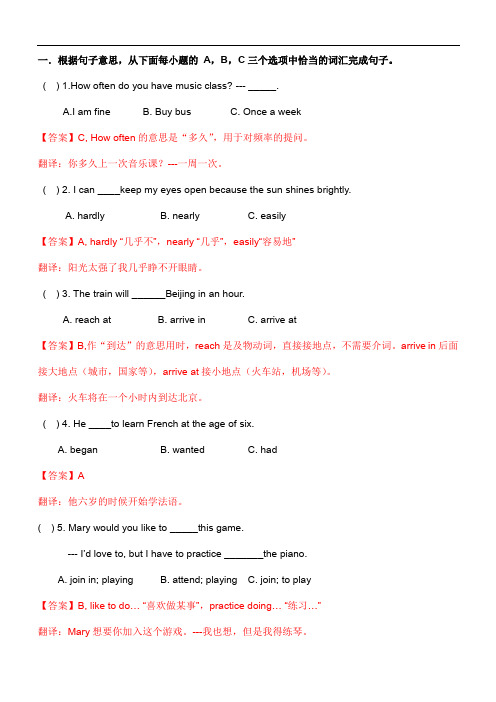
一.根据句子意思,从下面每小题的A,B,C三个选项中恰当的词汇完成句子。
( ) 1.How often do you have music class? --- _____.A.I am fineB. Buy busC. Once a week【答案】C, How often的意思是“多久”,用于对频率的提问。
翻译:你多久上一次音乐课?---一周一次。
( ) 2. I can ____keep my eyes open because the sun shines brightly.A. hardlyB. nearlyC. easily【答案】A, hardly “几乎不”,nearly “几乎”,easily“容易地”翻译:阳光太强了我几乎睁不开眼睛。
( ) 3. The train will ______Beijing in an hour.A. reach atB. arrive inC. arrive at【答案】B,作“到达”的意思用时,reach是及物动词,直接接地点,不需要介词。
arrive in后面接大地点(城市,国家等),arrive at接小地点(火车站,机场等)。
翻译:火车将在一个小时内到达北京。
( ) 4. He ____to learn French at the age of six.A. beganB. wantedC. had【答案】A翻译:他六岁的时候开始学法语。
( ) 5. Mary would you like to _____this game.--- I’d love to, but I have to practice _______the piano.A. join in; playingB. attend; playingC. join; to play【答案】B, like to do… “喜欢做某事”,practice doing… “练习…”翻译:Mary想要你加入这个游戏。
(牛津版深圳版)英语七年级上册词汇详解+练习(含答案)

1. grammar n.语法【衍生】阅读reading听力listening口语speaking/spoken English写作writing【考察项目】常规阅读和完形填空英语学习类文章出现【经典例句】①[牛津高阶字典]I find German grammar very difficult.我发现德语语法很难学。
②[牛津高阶字典]His pronunciation is good,but his grammar is terrible.他的发音不错,但他的语法极差。
2.sound n.声音v.听起来【衍生】感官动词总结:feel感觉look看起来smell闻起来taste尝起来listen to=sound【考察项目】辨析词:sound自然声音voice:人声noise:噪音感官动词+adj.sound+adj.【经典例句】①[课文原句]Learn to say the/i:/,/i/,/e/,/p/and/b/sounds.------学习去读/i:/,/i/,/e/,/p/和/b/这些音。
②[2015年沈阳]It sounds similar.这听起来很相似。
plete v.完成adj.完全的,完整的【衍生】pletely完全地complete=finish完成【经典例句】①[课文原句]Complete an email to a new friend.完成一个给新朋友的电子邮件。
②[牛津高阶字典]You can't leave until you complete the work.你们完成工作后才可以离开。
4.hobby n.爱好(hobbies)【衍生】对比:habit习惯学科:subject运动:sport【考察项目】写作题目:Having a good hobby is./My favourite hobby is.【经典例句】①[课文原句]Friends often write to each other about their hobbies.朋友们经常就他们的爱好写信给对方。
牛津上海版七年级英语上册(新初一暑假班)Unit1 同步讲义设计 介词 (带答案)
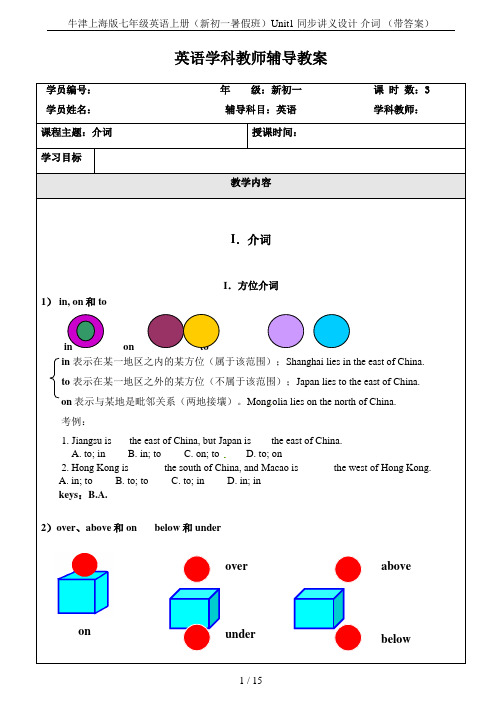
英语学科教师辅导教案 学员编号: 年 级:新初一 课 时 数:3 学员姓名: 辅导科目:英语 学科教师: 课程主题:介词授课时间:学习目标教学内容I .介词I .方位介词1) in, on 和toin on toin 表示在某一地区之内的某方位(属于该范围);Shanghai lies in the east of China.to 表示在某一地区之外的某方位(不属于该范围);Japan lies to the east of China.on 表示与某地是毗邻关系(两地接壤)。
Mongolia lies on the north of China.考例:1. Jiangsu is___ the east of China, but Japan is ___ the east of China.A. to; inB. in; toC. on; toD. to; on2. Hong Kong is ______ the south of China, and Macao is ______ the west of Hong Kong.A. in; toB. to; toC. to; inD. in; inkeys :B.A.2)over 、above 和on below 和underon under over abovebelowon指“在……上面”表示与表面接触。
其反义词是beneath.There is a cup on the desk. There is a note beneath the desk.above指“在……之上“指相对高度,不一定是正上方,其反义词是below.The plane flew above the clouds. The coat reaches below the knees.over指“在……之上”指垂直之上,正上方,其反义词是under.There is a bridge over the river. There are many bikes under the tree.below和underbelow表示“在下方或位置低于……”,不一定有“垂直在下”之意;under表示“在……正下方”。
沪教牛津版英语七年级上册各单元综合练习(期末复习)附答案
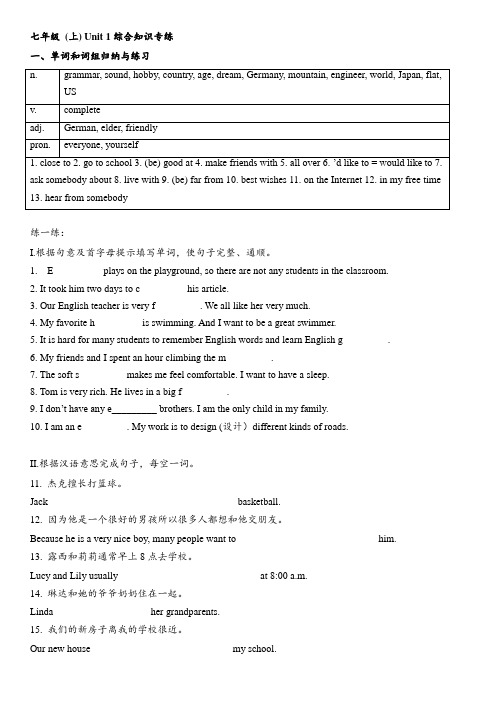
七年级(上) Unit 1综合知识专练一、单词和词组归纳与练习练一练:I.根据句意及首字母提示填写单词,使句子完整、通顺。
1. E _________ plays on the playground, so there are not any students in the classroom.2. It took him two days to c_________ his article.3. Our English teacher is very f_________. We all like her very much.4. My favorite h_________ is swimming. And I want to be a great swimmer.5. It is hard for many students to remember English words and learn English g_________.6. My friends and I spent an hour climbing the m_________.7. The soft s_________ makes me feel comfortable. I want to have a sleep.8. Tom is very rich. He lives in a big f_________.9. I don’t have any e_________ brothers. I am the only child in my family.10. I am an e_________. My work is to design (设计)different kinds of roads.II.根据汉语意思完成句子,每空一词。
11. 杰克擅长打篮球。
Jack_________ _________ _________ _________ basketball.12. 因为他是一个很好的男孩所以很多人都想和他交朋友。
牛津译林版七年级英语上册介词专练
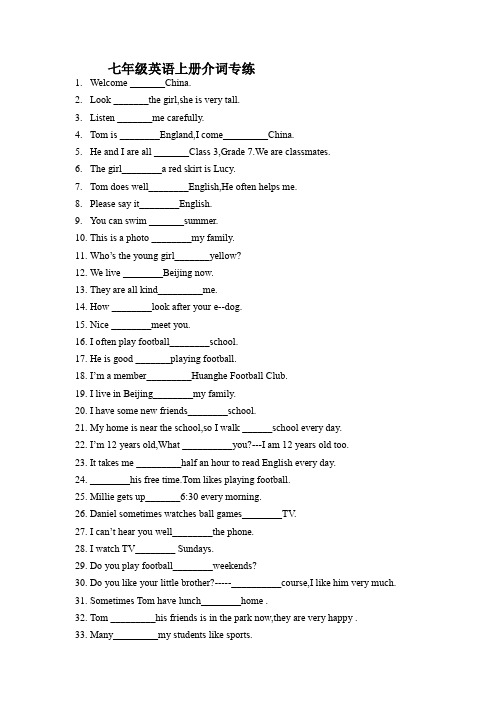
七年级英语上册介词专练1.Welcome _______China.2.Look _______the girl,she is very tall.3.Listen _______me carefully.4.Tom is ________England,I come_________China.5.He and I are all _______Class 3,Grade 7.We are classmates.6.The girl________a red skirt is Lucy.7.Tom does well________English,He often helps me.8.Please say it________English.9.You can swim _______summer.10.This is a photo ________my family.11.Who’s the young girl_______yellow?12.We live ________Beijing now.13.They are all kind_________me.14.How ________look after your e--dog.15.Nice ________meet you.16.I often play football________school.17.He is good _______playing football.18.I’m a member_________Huanghe Football Club.19.I live in Beijing________my family.20.I have some new friends________school.21.My home is near the school,so I walk ______school every day.22.I’m 12 years old,What __________you?---I am 12 years old too.23.It takes me _________half an hour to read English every day.24.________his free time.Tom likes playing football.lie gets up_______6:30 every morning.26.Daniel sometimes watches ball games________TV.27.I can’t hear you well________the phone.28.I watch TV________ Sundays.29.Do you play football________weekends?30.Do you like your little brother?-----__________course,I like him very much.31.Sometimes Tom have lunch________home .32.Tom _________his friends is in the park now,they are very happy .33.Many_________my students like sports.34.I have a lot _________good friends.35.We all like playing football,we often talk__________football together.36.Let’s meet _________the school gate_______4:30 p.m..37.Let me show you ____________our school.38.Please show this pen__________ Tom.39.Tom sits in front_________ Jim.40.My classroom is _________the ground floor.41.What’s the building __________there? It’s a library.42.Let’s go________ school together.43.Mr Wu is in a white shirt ________ the Open Day.44.I want to say hello________my English teacher.45.I often get_______ at 6:00 every morning.46.Don’t wake him ________ ,He is sleeping now,he is very tired(累).47.I usually get ________our school at 7:00 every morning.48.It’s a long way from my home________ the school.49.I often go to school ________bike .50.Tom often goes to school_________foot.51.There are all kinds _______books in our library.52.Thank you ________helping me.53.I live far away________the school.54.It’s time ________lunch now.55.It’s time ________have lessons now.56.It’s time________me _________have lunch now.57.It takes Tom 120 yuan _________buy a coat.58.Please go ________! I don’t want to see you again.59._________breakfast,I sleep,and then I have lunch.60.I’m never late ________ school.61.I start lessons at a quarter _________ eight every day.62.We often chat _________ each other.63.We often play football_________the playground.64.There is a park__________my home and our school.65.I want to go________ a picnic.66.Playing football is good_________ our health(健康).67.They help us get ready_________ the day.68.I spend 120 yuan________ my coat.69.I want to sing a song _________you.70.Tom is talking________Jim in the classroom.71.I play football _________half an hour every Sunday.72.Let us meet ________9 o’clock _________ night.73.They have PE lessons ________Monday and Thursday.74.We have four lessons________the morning.75.We will go to the park________the morning of Sunday.76.I watch TV __________Friday evening.77.Flowers come out ________spring.78.Tom was born ________1992.79.Tom could play football________the age of 12.80.We will meet ________29 October.。
Unit 3 The seasons 词汇、句型 专练(含解析) 七年级英语上册 牛津版(2024)
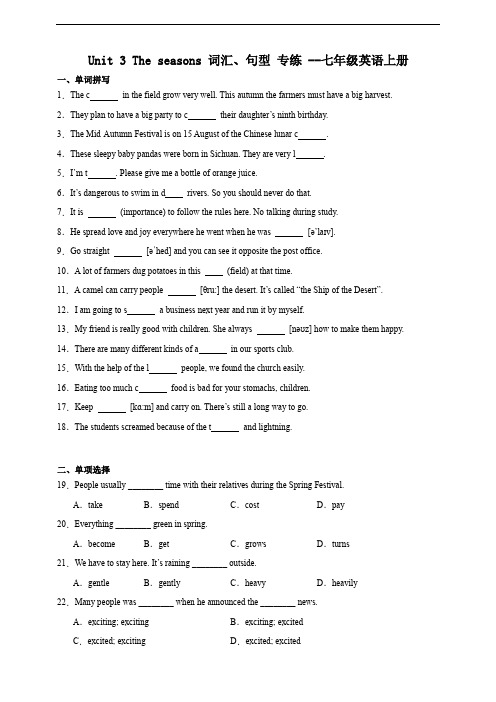
Unit 3 The seasons 词汇、句型专练 --七年级英语上册一、单词拼写1.The c in the field grow very well. This autumn the farmers must have a big harvest. 2.They plan to have a big party to c their daughter’s ninth birthday.3.The Mid-Autumn Festival is on 15 August of the Chinese lunar c .4.These sleepy baby pandas were born in Sichuan. They are very l .567891011121314151617181920A.become B.get C.grows D.turns21.We have to stay here. It’s raining ________ outside.A.gentle B.gently C.heavy D.heavily22.Many people was ________ when he announced the ________ news.A.exciting; exciting B.exciting; excitedC.excited; exciting D.excited; excited23.Children love ________ days.A.snowy B.snow C.snowing D.snows 24.—I saw your hands shaking when you spoke on the 100th birthday of CYL(共青团).—As a new member, I felt very _________.A.surprised B.relaxed C.excited D.interested 25.—It will be ________ this afternoon.2627282930313233More and more foreigners learn Chinese.34.我们有足够的时间准备舞会。
初一英语介词练习题40题答案解析版
初一英语介词练习题40题答案解析版1.I usually get up _____ six o'clock in the morning.A.atB.onC.in答案解析:A。
“at”用于具体的时间点,“six o'clock”是具体的时间点,所以用“at”。
“on”用于具体的某一天,“in”用于较大的时间范围,如年、月、季节等。
2.My birthday is _____ May.A.atB.onC.in答案解析:C。
“in”用于较大的时间范围,“May”是月份,属于较大的时间范围,所以用“in”。
“at”用于具体的时间点,“on”用于具体的某一天。
3.We have an English class _____ Monday morning.A.atB.onC.in答案解析:B。
“on”用于具体的某一天或者某一天的上午、下午、晚上,“Monday morning”是具体的某一天的上午,所以用“on”。
“at”用于具体的时间点,“in”用于较大的时间范围。
4.The meeting will start _____ 3 pm.A.atB.onC.in答案解析:A。
“at”用于具体的时间点,“3 pm”是具体的时间点,所以用“at”。
“on”用于具体的某一天,“in”用于较大的时间范围。
5.My father often goes to work _____ the morning.A.atB.onC.in答案解析:C。
“in”用于较大的时间范围,“the morning”是较大的时间范围,所以用“in”。
“at”用于具体的时间点,“on”用于具体的某一天。
6.We will have a party _____ Christmas Day.A.atB.onC.in答案解析:B。
“on”用于具体的某一天,“Christmas Day”是具体的某一天,所以用“on”。
“at”用于具体的时间点,“in”用于较大的时间范围。
牛津版初一上英语常用语法知识——介词阶段测试(答案解析)
一、选择题1.— May I have some wine?— No, you . You have to drive home later.A.shouldn't B.needn't C.mustn't D.may not C解析:C【解析】【分析】【详解】句意:——我可以喝一些酒吗?——不,你不可以。
你以后必须开车回家。
shouldn't不应该,needn’t不必,mustn’t禁止,may not可能不。
根据You have to drive home later.可知,你必须开车回家,因此表示你不可以喝酒,故用mustn’t。
故选C。
2.—Is that Kate’s green bike?—It ____________be hers. She likes pink.A.can’t B.could C.mustn’t D.might A解析:A【解析】【详解】句意:—那是凯特的绿自行车吗?—那不可能是她的。
她喜欢粉色。
考查情态动词用法。
can’t不可能,不能;could能,构成过去式;mustn’t一定不要,表示禁止;might大概,可能。
根据后一句凯特喜欢粉色可知,表示不可能,用can’t,故选A。
3.All passengers_____ go through safety check before they take a plane.A.may B.can C.must D.need C解析:C【解析】【详解】句意:所有乘客在乘坐飞机前必须经过安全检查。
考查情态动词辨析。
may可以,表许可或请求;can能,表能力或许可;must必须,指一定;need需要,指有必要。
根据句意语境可知,安检强调“必须,一定”,故选C。
4.—________your house be cleaned right now?—No,it needn't.It may be cleaned this afternoon.()A.Must B.May C.Can A解析:A【解析】【详解】句意:——你的房子必须现在打扫吗?——不,不必。
上海秋季牛津英语七年级上册七上介词的用法专题(含词汇语法练习)
1.上次课后巩固练习2.预习思考教学建议:1.老师用一些问题,比如:where is the ball? 学生根据图示用不同的介词进行表达。
2.老师可以让学员之间相互配合进行提问回答来考察介词的预习情况。
介词的用法【知识梳理1】时间介词at, on和in教学建议:1. 巩固练习部分,可以让学生互相讲解。
2. 巩固练习部分并未包含所有时间介词的考点,可以让学生互相提问不同时间前需要什么介词。
The teacher is sitting between the twins.(在两者之间)Lucy is dancing among her classmates.(在三者或三者以上之间)【例题精讲】例1. Maria sits between Lucy and Lily.例2. Miss Wang stands among her students.【巩固练习】1.翻译:浦东和浦西之间2.翻译:老师坐在同学们之间3.____ you and me.(between/among)4.翻译:人群之间5. 翻译:我们之间有很多不同。
keys:1.between Pudong and Puxi2.The teacher sits among students.3.Between4.Among the crowd5.There are many differences between you and me.【知识梳理5】across、through、over和pastacross 表示从物体表面穿过,如过马路,过河;go across。
He runs across the square to meet her.through 表示从物体内部穿过,如穿过森林,窗户;go through。
We walked through the forest.over 表示从物体正上方跨过。
The dog jumped over the fence and run away.past 表示从物体旁边经过;go past,walk past。
2024年牛津版初一上学期英语试题与参考答案
2024年牛津版英语初一上学期复习试题与参考答案一、听力部分(本大题有20小题,每小题1分,共20分)1、Listen to the following dialogue and choose the best answer to complete the sentence.A. What’s the weather like today?B. How was your vacation?C. How was your exam?Answer: BExplanation: The question asks about the person’s vacation, which is a common topic for follow-up questions after a dialogue. The correct response would be asking about the experience of the vacation.2、Listen to the question and the four possible answers. Choose the correct answer.Question: How many students are in your class?A. Twenty.B. Thirty.C. Forty.D. Fifty.Answer: AExplanation: The question asks for the number of students in the class. Thecorrect answer would be the one that corresponds to the number provided in the dialogue, which in this case is “Twenty.”3、Listen to the conversation between two students, Alex and Jamie, and choose the best answer to complete the following sentence.A. Alex is asking Jamie for help with his science homework.B. Jamie is telling Alex about his new favorite book.C. They are discussing their plans for the weekend.Answer: AExplanation: The conversation indicates that Alex is struggling with his science homework and Jamie is offering to help him, which matches option A.4、Listen to a short dialogue between a teacher and a student, and complete the following sentence with the correct information.The teacher asks the student about his progress in the English class. The student responds by saying:A. “I’m doing fine, thank you.”B. “I’m making good progress, but I need more practice.”C. “I’m not doing well; I find the grammar too difficult.”Answer: BExplanation: The student’s response suggests that while there are challenges, they are making progress and acknowledge the need for additional practice, aligning with option B.5.You are listening to a conversation between two students, Alice and Bob,discussing their weekend plans.Question: What is Alice planning to do this weekend?A. Go to the movies.B. Visit a friend in another city.C. Stay at home and read a book.Answer: CExplanation: In the conversation, Alice mentions that she is planning to stay at home and read a book this weekend. There is no mention of going to the movies or visiting a friend in another city. Therefore, the correct answer is C.6.Listen to a short dialogue between a teacher and a student, discussing the student’s assignment.Question: What is the teacher asking the student to do?A. Hand in the assignment tomorrow.B. Submit the assignment by the end of the week.C. Revise the assignment before the next class.Answer: CExplanation: The teacher in the dialogue asks the student to revise the assignment before the next class, indicating that there are some issues that need to be corrected. The teacher does not mention specific deadlines like tomorrow or the end of the week, so the correct answer is C.7、Listen to the following dialogue and choose the best answer to the question you hear.A. The man is going to the library.B. The woman is looking for a book.C. The man is helping the woman find the book.D. The woman is asking for help to find the library.Answer: CExplanation: In the dialogue, the woman asks the man if he can help her find a book, which indicates that she is looking for assistance in finding something. Therefore, the correct answer is C.8、Listen to the following passage and choose the best answer to the question you hear.A. The speaker is explaining the importance of exercise.B. The speaker is talking about the benefits of a healthy diet.C. The speaker is discussing the importance of getting enough sleep.D. The speaker is giving advice on how to improve one’s lifestyle.Answer: AExplanation: The passage focuses on the importance of regular exercise and its impact on physical and mental health. The speaker mentions the benefits of exercise, such as reducing stress and improving energy levels. Therefore, the correct answer is A.9.You hear a conversation between two students discussing their weekend plans.A. What are they planning to do this weekend?B. Who is going to join them?Answer: A. What are they planning to do this weekend?Explanation: The question asks about the content of the conversation, specifically about the plans they have for the weekend. The correct answer should reflect that information.10.You hear a short dialogue between a teacher and a student about an upcoming assignment.A. What is the assignment about?B. When is the assignment due?Answer: B. When is the assignment due?Explanation: The question focuses on the timing of the assignment. The correct answer should provide the specific date or deadline mentioned in the dialogue. The content of the assignment is not the primary focus of this question.11.You are listening to a conversation between two friends, Alice and Bob. They are discussing their favorite book.Alice: Hey Bob, have you ever read “To Kill a Mockingbird”?Bob: Yes, I have. It’s one of my fa vorite books.Alice: Really? Why do you like it so much?Bob: Well, it’s not just the story, but also the way the author, Harper Lee, writes about the characters and the themes of racism and injustice.Question: What does Bob like most about “To Kill a Mockingbird”?A) The storyB) The author’s writing styleC) The themesD) The charactersAnswer: B) The author’s writing style解析:在对话中,Bob提到他喜欢《杀死一只知更鸟》不仅仅是因为故事,还因为作者Harper Lee对人物和主题的描写方式。
- 1、下载文档前请自行甄别文档内容的完整性,平台不提供额外的编辑、内容补充、找答案等附加服务。
- 2、"仅部分预览"的文档,不可在线预览部分如存在完整性等问题,可反馈申请退款(可完整预览的文档不适用该条件!)。
- 3、如文档侵犯您的权益,请联系客服反馈,我们会尽快为您处理(人工客服工作时间:9:00-18:30)。
七年级英语介词用法介绍及练习介词又叫前置词,是一种虚词。
介词分为三种:1.一种是简单介词,如at, in, on, beside, to , for等;2.另一种是短语介词,即由两个以上的词组组成的短语,如in front of,because of,out of,instead of等;3.还有一种叫二重介词,如until after,from behind等。
(一)介词的句法功能介词不能独立在句中做成份,介词后必须与名词、代词、或动名词构成介词短语在句中充当一个成份,表示人、物、事件等与其它人、物、事件等之间的关系。
作定语:The book on the table is mine.1、作状语:We have breakfast at seven.(表时间);2、作表语:My dictionary is in the bag.3、作宾语补足语:I found him in the office.(二)主要介词区别1、表示时间的at, in, on:at表示片刻的时间,如:at 8 o'clock ,常用词组有:at noon, at night, , in表示一段的时间,如:in the morning, in the afternoon, on总是跟日子有关,on Monday, on Christmas 2、表示时间的since和from:since表示从过去到现在的一段时间的过程,常与现在完成时连用。
from表示从时间的某一点开始,不涉及与现在的关系。
一般多与现在时、过去时、将来时连用。
如:I hope to do morning exercises from today./ We have not seen each other since 1995.3、表示时间的in和after:两者都表示"在(某个时间)之后,区别在于in表示"在(一段时间)之后",而after则表示"在(某一具体时间点之后)",in短语和将来时态连用,after短语和过去时态或将来时态连用。
如:We'll be back in three days./ After seven the rain began to fall.注意:after有时也可以表示在一段时间之后(常用在过去时里)。
如:After two months he returned.4、表示地理位置的in, on, to:in表示在某范围内,on指与什么毗邻,to指在某环境范围之外。
如:Changchun is in the northeast of China./ Mongolia is on the north of China./ Japan is to the east of China.5、表示"在……上"的on和in:on只表示在某物的表面上,而用in表示占去某物一部分。
如:There is a book on the piece of paper./ There is an interestin-g article in the newspaper./ He dug a hole in the wall.6、表示"穿过……"的through和across:through表示从内部通过,与in 有关;across则表示从一端至另一端在表面上的通过,与on有关。
如: Water flows through the pipe./ The old man walked across the street.7、in the corner, on the corner, at the corner:in the corner 表示在角落里,in指角的内面;on the corner表示"在角上",on指的不是内面,也不是外面,而含内外兼有之意;at the corner指"在拐角处",at指的是拐角外附近的外面。
如:The lamp stands in the corner of the room./ I met with him at the street corner./ He sat on the corner of the table.8、in the end, at the end of, by the end of:in the end作"最后"、"终于"解,可单独使用,后不接介词of;at the end of 表示"在……末梢","到……尽头",既可指时间,也可以指地上或物体。
不可单独使用;by the end of 作"在……结束时","到……末为止"解,只能指时间。
不可单独使用。
如:In the end they reached a place of safety./ At the end of the road stands a beautiful garden./ They d ecided to have an English evening at the end of this week./ by the end of last month he had finished the novel.9、表示"关于"的about 和on:两者都有"关于"的意思,不过前者为一般用词,而后者为较正式的"论述"。
如:He came to tell me about something important./ He wrote a book on science.10、between, among:一般说来,between表示两者之间,among用于三者或三者以上的中间。
如:You are to sit between your father and me./ He is always happy among his classmates.注意:但有时说的虽然是三个以上的人或东西,如果强调的是两两相互间接关系,适用于between。
如:Agreements were made between the different countries. 在谈到一些事物或一组事物,而把它们视为分居两边时用between。
如:The little valley lies between high mountains.。
在谈事物间的差别时,总是用between。
如:They don't know the difference be tween wheat, oats and barley.11、besides, except, but, except for:besides指"除了……还有,再加上"。
如:All went out besides me.;except指"除了,减去什么",不能放在句首。
如:All went out except me.;but 与except意思近似,表示"除了……外"经常用在no, all, nobody, anywhere, everything等和其他疑问词后面。
如:I never saw him reading anything but the newspaper.;except for表示"如无……就,只是"表明理由细节。
如:His diary is good except for a few spelling mistakes.12、表示"用"的in和with:表示工具的"用",用with,而表示材料、方式、方法、度量、单位、语言、声音等的"用",用in。
如:He is writing a letter with a pen./ He wrote the letter in pencil./ We measured it in pounds./ Read the text in a loud voice./ Tell me the story in English.13、in charge of和in the charge of:两者都表示"由谁负责、照顾、管理"。
区别在于:in charge of后接被照管的人或物,而in the charge of后面则跟照管的人。
如:Who is in charge of the project?/ The project is in the charge of an engineer.。
14、as, like:as作"作为"、"以……地位或身份"解。
如:Let me speak to you as a father.(事实是父亲);like作"象……一样"解。
如:Let me speak to you like a father.(事实上不是父亲)。
15、in front of 和in the front of:in front of = before,是"在……前面"的意思(不在某物内); in the front of则是"在……前部"的意思(在某物内)。
如:There is a desk in front of the blackboard./ The boy sat in the front of the car.。
16、in, into:into表示动向,不表示目的地或位置。
如:We walked into the park.;in通常表示位置。
如:We walked in the park;in和drop, fall, put, throw, break等终止性动词连用时,也可以表示动向。
如:I have put the coin in (into) my pocket.我把硬币放进衣袋。
介词专项练习1. The teacher is writing ____ a piece of chalk on the blackboard while the students are w riting ____ink in exercise books.A. with, inB. in, withC. in, inD. with, with2. The worker can make chairs ____ wood, and also can make paper ____ wood.A. from, ofB. of, fromC. of. ofD. from, from3. Mary dropped in ____ Mr Smith, but he wasn' t at home, so she went to drop in ____ Mr Smith's office.A. on, onB. at, atC. on. atD. at. on4. The teacher is not only strict ____ his pupils but also strict ____ his own work.A. with, withB.in,inC. in, withD. with, in5. His grandfather died ____ the wound that the enemy soldier had given him .and then hi s grand-mother died ____ hungry and cold.A.from,ofB.of,fromC.from,fromD.of.of6. If you run ____ two hares you will catch neither.A.intoB.afterC.offD. out of7. This is a common mistake ____ students.A. betweenB.overC. amongD. about8. My father began to work ____ a bus driver when he was twenty years old.A.forB.toC.atD.as9. _____ hearing the news, I was wild ____ joy.A. At, inB. On, withC. After, byD. /, over10.I don' t think Xiao Li is ____ the other students ____ mathematics.A. after, onB. after, withC. behind, inD. behind, at11. Nobody knows it ____ me.A. except forB. except thatC. besidesD. but12. The window is never opened ____ in summer.A. butB. exceptC. except forD. but for13. It happened ____ the Long March.A. duringB.inC.atD.for14. We go to school ____ a bike.A.inB.onC.byD.ove15. It's very kind____ you to repair the bike ____ me.A.for.forB.of,ofC.of,forD.for,of16. Fresh air is good ____ your health.A.atB.forC.ofD.to17.The boy is waiting ____ his sister and they will go to the hospital to wait ____ their sic k mother.A.for,onB.on,forC.for,forD.on.on18.The group is made up____fivestudents. And they are studying hard to make up____ the lost time.A.of,ofB.for,forC.of,forD.for,of19.The PLA man saved the boy ____ death.A. ofB.fromC.toD.on20. He will come ____ three days.A.beforeB.afterC. inD. later21. He went to Beijing and returned ____ three days.A. inB. beforeC. laterD. after22. He will return____three o'clock.A.afterB.inC.onD.at23. He wrote the article ____ three days.A.atB.inC.onD.by24.I agree ____ what you said.A.toB.onC.withD.at25. Do you agree____ this plan (arrangement)?A.atB.withC.onD.to26. Finally they agreed ____ the terms of the contract.A.onB.toC.withD.at27. Do you often hear____ your brother?A. ofB. fromC. out ofD. about28.1 heard ____ the book long ago, but I have never read it.A. outB.fromC.ofD.with29. The plane flew ____ the city.A. acrossB.pastC. throughD.over30. We walked ____ the Tian An Men Square to the Museum of Chinese History.A. acrossB. throughC.byD.past31.I was wandering ____ the streets when I caught sight of a tailor's shop.A. acrossB. throughC.byD.past32. Our bus drove ____ the Great Hall of the People.A. acrossB. throughC. pastD.over33. ____ the sun, nothing would grow.A. ForB.WithC. UnderD. Without34. The teacher is busy ____ teaching.A.withB.forC.onD.of35. The teacher is busy ____ correcting papers.A. forB.inC.onD.of36. We left Xi' an _.___ a very hot summer afternoon.A. onB.inC. duringD.by37. She felt disappointed when she found out they had gone swimming____ her.A. butB. exceptC. except forD. without38. His teacher was angry ____ him ____ his beinglate.A.at,withB.at,forC.with,forD.with,about39. My father was disappointed ____ the news.A. byB. aboutC. atD. on40. Mr Wang went to Nanjing ____ October,1998 and came back home ____ the morning of Nov. 5.A.at;inB.on;atC.in;onD.by;from41 .My uncle lives ____ 105 Huanghe Street. His room is ____ the fifth floor.A.at;onB.td;atC.on;inD.of;to42. I don't think you can work out the maths problem ____ the teacher's help.A. sinceB. unlessC. becauseD. without43. He is running ____ the wind towards the east of the station ____ Tom is running ____the right.A. down; and; onB. against; while; onC.for;with;inD. with; while; to44. In Hangzhou Mr Green was so struck ____ thebeauty of nature that he stayed ____ another night.A.at;onB.with;atC.for;inD.by;for45. Many people are still ____ the habit of writing silly things ____ public places.A.at;atB.in;inC.into;ofD.during;at46. - Do you go there ____ bus? - No, we go there ____ a train.A. in; onB.on;onC.by;inD.by; with47. I made the coat ____ my own hands. It was made ____ hand, not with a machine.A. in; inB.in; withC. with; byD. with; with48. The trees ____ front of the house are ____ thecharge of Old Li.A. in; inB. at; inC. in; byD. from; in49. The old man died ____ cold ____ a cold night.A. from; atB.of;inC.of;onD. for; during50. Does John know any other foreign languages ____ French?A. exceptB. butC. besidesD. beside51. He looked quite healthy ____ he was ____ the age of seventy.A. when; atB. because; inC. if; forD. though; at52. - How long has the bookshop been in business? -____1982.A. AfterB.InC.FromD.Since53. Did you have any trouble ____ the post office?A. to have foundB. with findingC. to findD. in finding54.To tell you the truth, I have nothing to do ____ it.A.aboutB.withC.forD.of55. Something must be done to prevent our city ____by thick smoke.A. to be pollutedB. from pollutingC. from being pollutedD. polluting56.____ the students likes the paintings. Which iswrong?A. The teacher as well asB. Nobody butC. The teacher besidesD. All except57. Henry,____ Mary and Tom, is coming to China for a visit. Which is wrong?A. together withB. likeC. and notD. but in addition to58. T aiwan is ____ the east of Fujian.A. inB.atC.toD.on59. His father will be back from London ____ a fewdays.A.sinceB.inC.onD.after60. We offered him our congratulations ____ his passing the college entrance exams.A.atB.onC.forD.of介词(答案)1~5 ABCDA 6~10 BCDBC 11~15 DBABC 16~20 BACBC21~25 DABCD 26~30 ABCDA 31~35 BCDAB 36~40 ADDCC41~45 ADBDB 46~50 CCACC 51~55 DDDBC 56~60 DCCBB。
